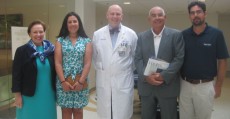
Our friend César Melián ran the ING NYC Marathon last November to raise funds for sarcoma research as a tribute to María. Thanks to his initiative, he finished the race in a personal record of 4 hours and 3 minutes, and the donations of all the people who offered their support, we raised $1,185 for the Duke Cancer Institute, joining our efforts once again in the battle against sarcoma.
Here is an update from Dr. Brigman MD about what is happening in sarcoma research at the Duke Cancer Institute.
“Our goal here at the Duke Cancer Institute is to provide collaborative compassionate care based on the leading edge of discovery science. In the years since Maria received her treatment, there have been incremental advances in sarcoma treatment, including some use of TKI inhibitors and other novel biologics. These medical therapies remain in the evaluation stage, with no significant change in the standard of care as of yet. As you know, sarcomas as a whole are extraordinarily rare, with less than 15,000 diagnosed in the US in any given year, making research challenging. With more than 75 different individual histologies, all with unique biology the challenges in developing new diagnostic and therapeutic tools for a particular diagnosis becomes particularly challenging. Research has played an integral role in those improvements and in our ability to fulfill our healing mission here at Duke. We are, of course, part of ongoing multi-institutional new sarcoma drug trials, led by Rich Riedel MD, as a part of the SARC (Sarcoma Alliance through Research Collaboration). Our in house research has focused on finding and using appropriate models of sarcoma for ongoing sarcoma basic and translational research. David Kirsch MD PhD, a Duke Sarcoma radiation oncologist has developed an incredible genetically engineered mouse model of pleomorphic undifferentiated sarcoma, the most common soft tissue sarcoma on humans, which we have characterized and used for a variety of basic and translational projects. I am most excited though, about our emerging sarcoma comparative oncology program. You may know that sarcoma, both osteosarcoma and soft tissue sarcoma, are more common in dogs than in humans. The histology, biology and natural history are the same. This fact has recently led the NCI to develop a comparative oncology program to incorporate companion animals with de novo cancers into diagnostic and treatment protocols. Increasing the number of available patients (dog or human) greatly increases our ability to better provide meaningful diagnostic and therapeutic answers for the questions surrounding sarcoma. We have a new member of the sarcoma team, Will Eward DVM MD, who is an orthopaedic oncologic surgeon like me with a tumor practice at Duke, but also is a veterinarian with a sarcoma specific veterinary practice in the Triangle as well. Besides providing more patients for discovery, comparative oncology programs provide a fast track for translation. A great example of our recent success is our intra operative imaging project. Using the genetically engineered mouse model of sarcoma, David Kirsch and others developed a cathepsin activatible imaging probe that can be used intraoperatively to assess for residual tumor after a sarcoma resection. This technology was licensed to a startup company in Boston called Lumicell. Together with Lumicell, we have shown that using these probes, we are able to predict local recurrence in mice after sarcoma surgery, with much greater accuracy than histologic evaluation of the margin. We were able to then translate this into de novo sarcomas in dogs, and found that the device was able to image a variety of tumor types and grades. We now are nearing the end of a first- in- human, phase I study of the probe in humans. Hopefully, we will be able to move this research forward to a phase II multi-institutional study. We have interest from the MGH, Sloan-Kettering and MD Anderson in being a part of this potentially paradigm shifting study.”


